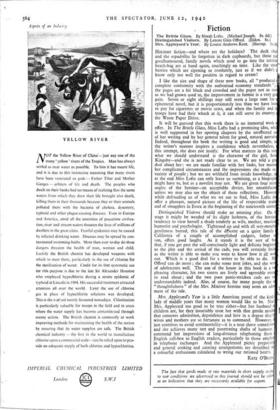Fiction
HOLIDAY fiction—and where are the holidays? The deck eh and the espadrilles lie forgotten in dark cupboards, but those ni goodhumoured, family novels which used to go into the creto beach-bag are at hand again, touchingly on time. Like the stra berries which are ripening so resolutely, just as if we didn't know only too well the position in regard to cream!
I like the size and shape of these new books, all " produced complete conformity with the authorised economy standards " ; the pages are a bit black and crowded and the paper not as suai as we had grown used to, the improvement in format is a very gr gain. Seven or eight shillings may still seem a large sum for ephemeral novel, but it is proportionately less than we have lea to pay for cigarettes or movie seats, and when the family and t troops have had their whack at it, it can still serve its country the Waste Paper Drive.
It will be guessed that this week there is no immortal work offer. In The Brittle Glass, Miss Lofts had a promising idea, whi is well supported in her opening chapters by the unaffected e of her writing and by her general talent for good, natural narrati Indeed, throughout the book the writing is good and simple, the writer's manner inspires a confidence which nevertheless, this attempt, she does not justify. For what matters in this sto what we should understand is the character of the girl, So Kingaby—and she is not made clear to us. We are told a gr deal about her: we are made familiar with her looki, her man her complicated circumstances and the impressions she made on variety of people ; but we are withheld from inside knowledge, at the end Miss Lofts can only leave us surmising, as a biograp might have to, but as a novelist may not. We are given four m angles of the heroine—an acceptable device, but unsatisfact unless we may also see the object of these reflections. Hower while defrauding us of what we set out to find, Miss Lofts d offer a pleasant, natural picture of the life of respectable trad and of smugglers in Essex at the beginning of the nineteenth cen Distinguished Visitors should make an amusing play. On stage it might be weeded of its slight lushness, of the heroin tendency to view herself a shade tenderly as wife, mother, musici humorist and psychologist. Tightened up and with all wry-mouth gentleness barred, this tale of the descent on a quiet family California of a couple of accomplished cadgers, father son, offers good laughs. As it stands it is the sort of that, if you get past the self-consciously light and delicate beginn to the plot and the arrival of the cads, you will certainly fini as the writer is able to make you want to know how it all wo out. Which is a good deal for a writer to be able to do. A Offord can do more ; she can make some neat jokes, and she writ of adolescents well. The son of the house in this book is a r pleasing character, his two sisters are lively and agreeable eno to read about ; and the two poor panic-stricken cads are N understandable indeed. Also, of course, for many people the s " thoughtfulness " of the Mrs. Miniver heroine may seem an ado ment of the tale.
Mrs. Appleyard's Year is a little American pastel of the kind lady of middle years that many women would like to be. Nor Mrs. Appleyard too good to be true either—but her husband children are, for they invariably treat her with that gentle mock that connotes admiration, dependence and love in a degree that f wives and mothers are so fortunate as to command. However, just contrives to avoid sentimentality—it is a near shave sometim and she achieves many tart and penetrating shafts of humour. commend her impressions of long-distance telephoning from English call-box to English readers, particularly to those emplo. in telephone exchanges. And the Appleyard picnic preparat and general cooking and catering arrangements are described a colourful enthusiasm calculated to wring our rationed hearts.
KATE 011tus


























 Previous page
Previous page